Economist Impact, supported by Google, conducted a survey of 1,375 employees across Asia-Pacific (APAC), including 100 employees from Australia, between November 2022 and January 2023. It also interviewed employers and industry experts across the region to understand their perspectives on skills gaps, as well as reskilling and upskilling aspirations.
The survey respondents were drawn from across 14 markets in the region, out of which 11.8% were Gen Z (born in 1997-2012), 63.2% were Millennials (1981-96) and 25% were Gen X (1965-80). They all worked in a diverse mix of industries.
The research shows that across the region, common understanding is lacking between employers and employees about future skills and the best way to develop them. In some instances, there is also an expectation mismatch between what employers want and what employees see as being important. Understanding these gaps will be instrumental in creating a workforce that is prepared for the economy of the future.
This article —one in a series of 12 market reports—examines these issues in Australia. This series complements a research paper that looks at the reskilling and upskilling imperative across APAC.
Key findings
- The rapid digitalisation of businesses in Australia places digital skills (47%) as a key focus area for both employees and employers. Within the broader category of digital skills, advanced capabilities in data analysis and visualisation (38%), cybersecurity (34%) and IT support (34%) are considered must-haves.
- Australian employees are strongly motivated to upskill, with 40% saying that it highly impacts their ability to find more meaningful careers. For 61% of Australians, meaningful careers trump ones with higher pay (16%) and flexibility (32%).
- A majority of employees in our survey (67%) consider self-management skills such as time-management and active learning as essential, and more important than all other skills, for the workforce today.
As Australian businesses digitalise rapidly, 87% of job roles are expected to require digital literacy.1 The need for digital skills is not only confined to the ICT sector, but also in adjacent industries such as finance, healthcare and government.2 However, demand is outpacing the current supply: every year, only 6,500 IT graduates are available to fill the annual demand for 60,000 workers.3 The National Skills Commission reported that the number of occupations struggling to fill positions had doubled between 2021 and 2022.4 Vacancy rates in tech are 60% higher than the national average and, without appropriate action, Australia will be short on 186,000 workers.5
Moreover, the Australian government and tech sector have jointly committed to create 1.2m tech jobs by 2030, which requires adding 653,000 people to the existing workforce.6
Increased importance of self-management and advanced digital skills
According to the Economist Impact survey, 67% of Australian employees prioritise bettering their self-management7 skills, higher than the regional average (53%). Skills such as time-management and active learning are becoming essential across different industries, highlights Patrick Kidd, chief executive officer, Digital Skills Organisation, Australia. He says “these skills are applicable across all industries and different job roles, and are becoming increasingly important.”
Figure 1: Australian employees prioritise self-management over other skills
Which skill categories do you think are the most important for the workforce in your sector to acquire today? (% of respondents)
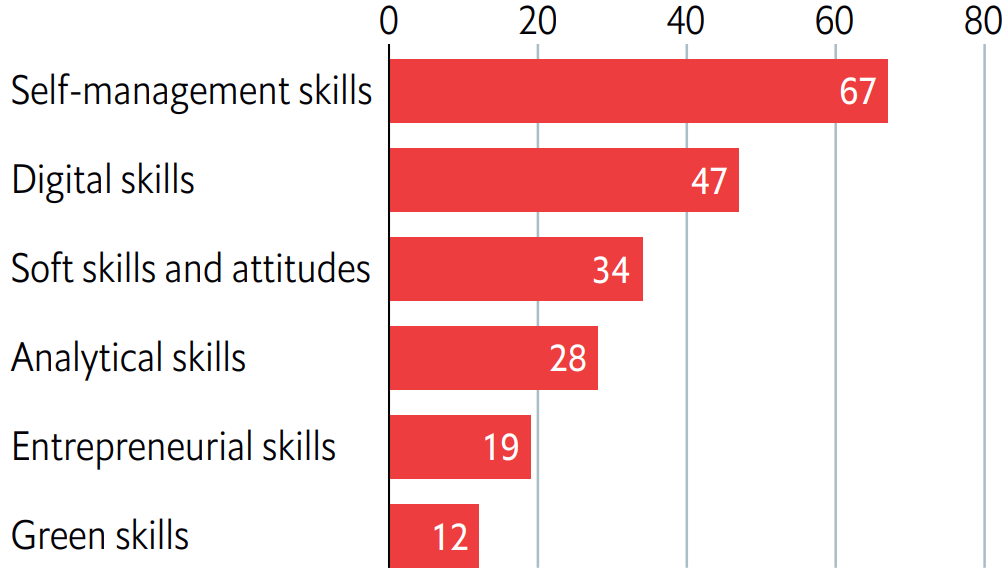
Source: Economist Impact, 2023
Nonetheless, almost half (47%) of employees consider digital skills as the most important for the workforce today. Within digital skills, advanced capabilities in data analysis and visualisation (38%), cybersecurity (34%) and IT support (34%) are considered must-haves. Phil Loveder, the executive manager of inform and engage at the National Centre for Vocational Education Research (NCVER), Australia, highlights the rising skills gap in cybersecurity. On this, he explains, “data confidentiality, protection and privacy is a massive issue in Australia, and we can’t get enough cybersecurity people at the moment.” On its current trajectory, Australia will be short of 30,000 cyber professionals by 2026.8
As the Australian tech sector has ballooned to a US$429.6bn market,9 so too has the country’s vulnerability to cybercrime, which costs an estimated US$1bn annually.10 The government has recognised the issue and allocated US$1.35bn to boost growth in the cybersecurity industry.11 This, in turn, has resulted in an industry-wide surge in demand for cybersecurity capabilities, with IT teams looking to drive technological progress.12
Figure 2: Must-have, good-to-have and not needed digital skills for employees in Australia
Indicate the desirability of specific digital skills for the workforce in your sector today? (% of respondents)
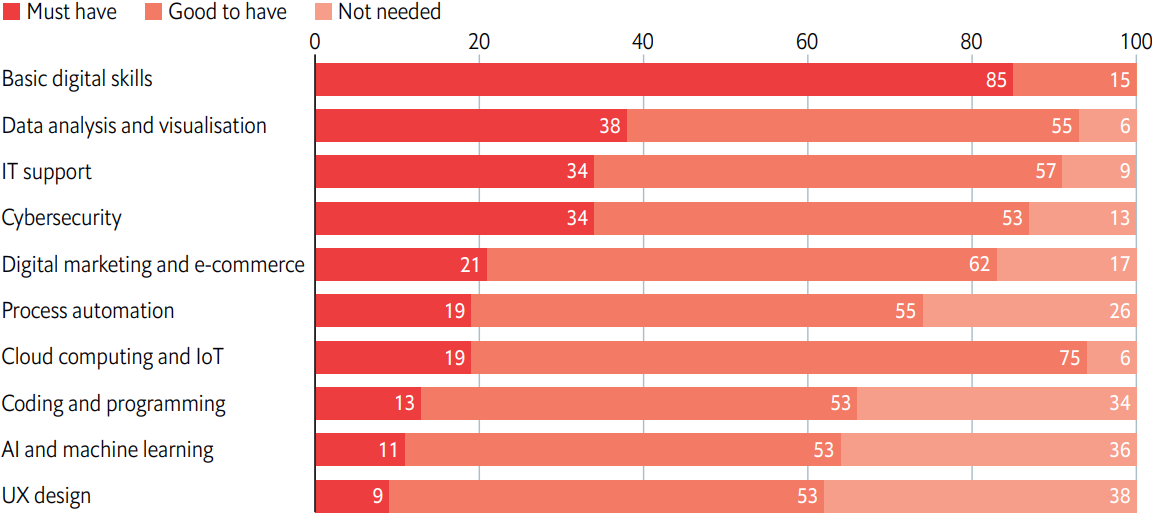
Source: Economist Impact, 2023
Australia lags in green skills uptake, with only 12% of employees considering these essential to acquire. The country has grappled with perceptions of being a laggard on climate action when compared with other developed OECD economies.13 14 This is likely to change in the coming years, as Australia has committed to ambitious carbon emissions targets.15 Mr Loveder adds that a “substantial move towards green technologies” will create greater momentum, which will in turn drive up green reskilling.
Australians know that upskilling has real benefits, but barriers remain
Across all skillsets, Australian employees demonstrate a strong sense of personal initiative to upskill—for career progression, promotion opportunities and to improve their current job performance. Updating their skillset has positively impacted their salaries and bargaining power (71%) as well as their ability to find more meaningful careers (71%).
Figure 3: Upskilling has a high impact on Australians’ salaries, bargaining power and careers
Based on your experience, rate the impact that upskilling and reskilling have had on your role or career? (% of respondents)
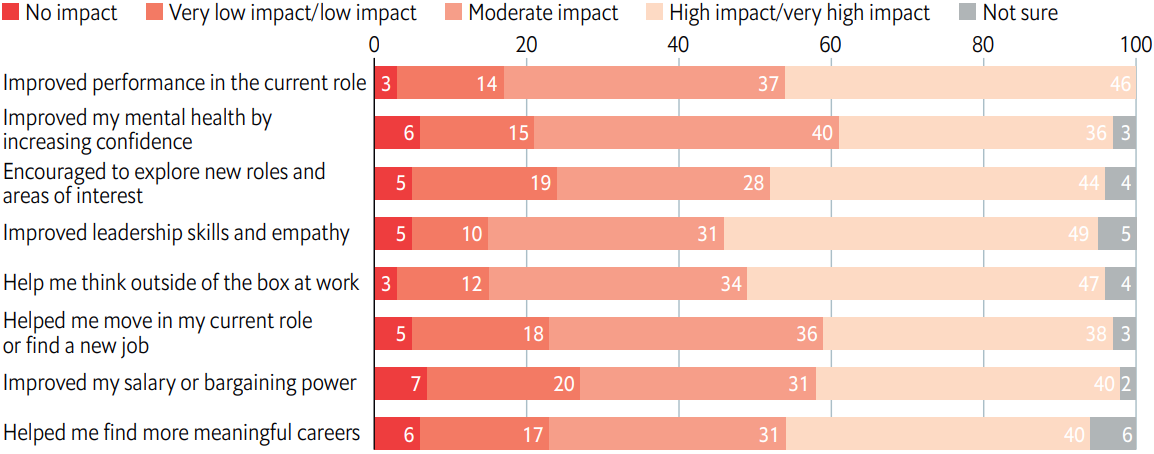
Source: Economist Impact, 2023
Yet, barriers limit Australians’ access to skilling resources. When it comes to acquiring digital or analytical skills, Australian employees cite the high cost of courses as the biggest barrier, picked by 32% and 36% of respondents respectively. Soaring university fees16 could limit employees’ access to analytical skills, which respondents report are largely acquired in-person at the tertiary level or at coaching institutes (32%). Meanwhile, 34% of employees found it challenging to acquire soft skills due to difficulties in attending in-person courses, leading most to rely on self-learning (46%) to upskill in this area.
Figure 4: Employees face barriers to upskilling due to a lack of resources and time
What are the top barriers you face in learning digital, analytical and soft skills? (% of respondents)
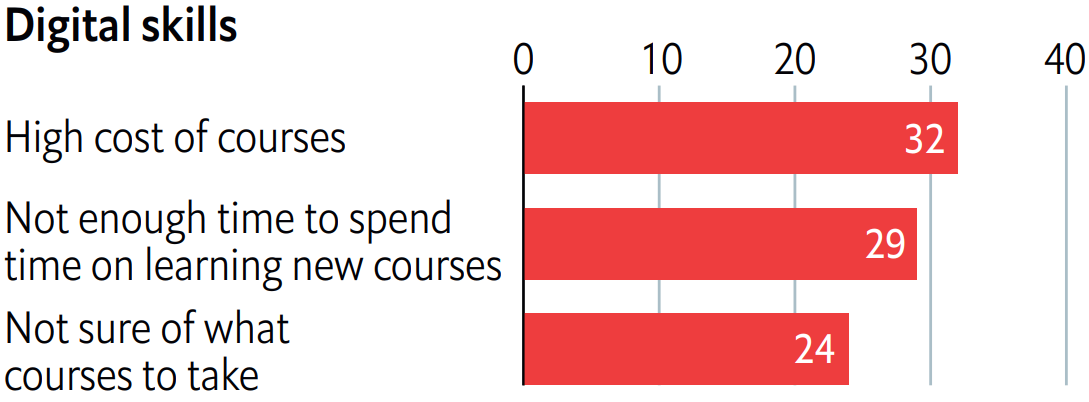
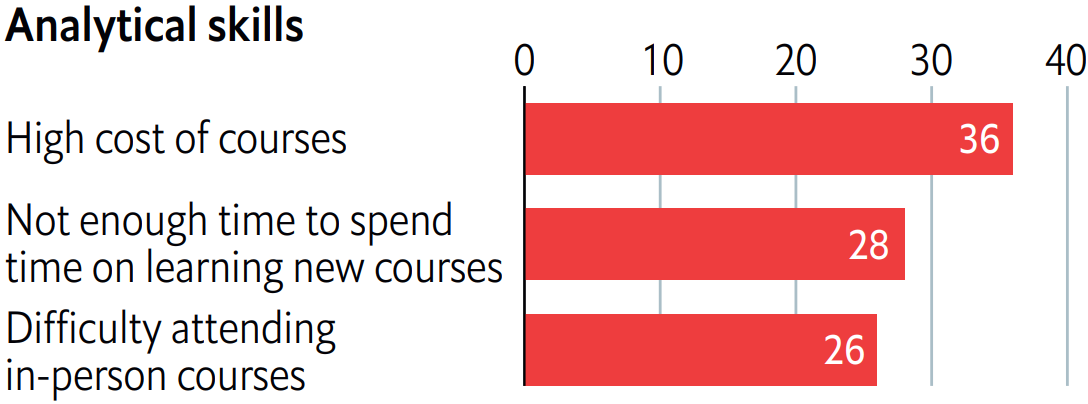
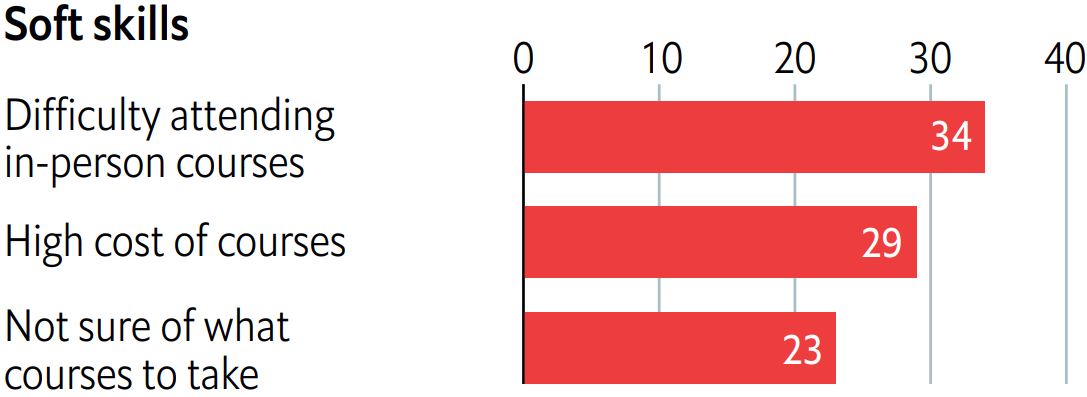
Source: Economist Impact, 2023
Public-private partnerships bolster access to information and funding
To address these barriers, experts reinforce the key role of employers in creating the right environment for learning. Employers could enable employees to retrain through online programmes, which tend to be less resource-intensive than in-person courses and can be especially effective for mass upskilling, says Mr Kidd. Despite these advantages, only 30% of employees in our survey believe that employers value online certificates. However, this could change, as 61% of employees also say their employers are shifting the focus of hiring from valuing full-time degrees to skill-based qualifications, a shift to focusing on the skills themselves rather than methods of learning.
While employees in our survey place the primary responsibility of upskilling on employers, they also consider the government as playing an important role through providing financial incentives (48%) and access to diversified reskilling programmes (44%). In recent years, the government has allocated around US$1bn towards supporting free or low fee training for jobseekers and young people.17 “Other examples cited by Mr Loveder include financial supports by governments aimed at easing the costs to students undertaking higher-level training in courses that address workplace and industry needs”.
The government and employers can also work together to address the information gap on skills. Currently, 63% of employees look to their employer for information on the skills needed for different roles, compared with 37% who consider the government most responsible. Given the government’s greater access to data and cross-industry information, it could support the business community by better defining a skills taxonomy to support hiring processes and employees’ upskilling plans. Doing so would also help in developing diverse skilling programmes that target the skills gap.
As Australia looks ahead, employees will continue to chase careers that are meaningful (61%) over ones with higher pay (16%) and flexibility (32%). Moreover, as demand for more advanced skills rises, training providers need to prioritise programmes that directly address the digital skills shortages facing Australia today without neglecting the importance of highly prioritised self-management skills. “We need to do more to broaden the scope of the training experience to encourage problem solving and adaptability,” says Simon Walker, the managing director of NCVER.
References
1 https://www.smh.com.au/business/workplace/on-the-way-up-the-rise-of-fast-skills-in-the-digital-workplace-20220210-p59vix.html
3 https://www2.deloitte.com/content/dam/Deloitte/au/Documents/Economics/deloitte-au-economics-australias-digital-pulse-2021-160621.pdf
4 https://www.theguardian.com/australia-news/2022/oct/06/staggering-occupations-facing-skills-shortages-in-australia-almost-doubled-in-past-year
7 According to the Economic Impact survey, self-management skills comprise ability with time management, active learning, resilience, stress tolerance and flexibility.
9 https://techcouncil.com.au/wp-content/uploads/2022/08/Turning-Australia-into-a-regional-tech-hub_Report-2022.pdf
12 Ibid
13 https://www.theguardian.com/environment/2021/aug/09/australia-lagging-at-the-back-of-the-pack-of-oecd-countries-on-climate-action-analysis-finds







